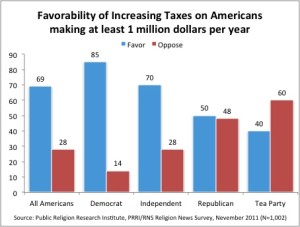
This vision of America, Obama argued, is close enough to grasp. He spent the rest of the speech outlining the serious policy changes needed to bring these basic American values within reach. Among many other concerns, he called for corporate tax reform, education reform, affordable higher education, cleaner and cheaper energy, and a overhaul of the tax code that incorporates the “Buffett Rule,” which would raise taxes on Americans who make more than $1 million a year to 30%.
These are all ambitious goals, and Obama acknowledged that he will need bipartisan support to accomplish many of them. “We need to end the notion that the two parties must be locked in a perpetual campaign of mutual destruction,” he said, calling on Congress to work together to produce a “smarter, more effective government.”
The speech was given on the same day that Mitt Romney released his tax returns, setting up a striking parallel that is sure to resonate throughout the presidential campaign. The tax returns revealed that Romney paid 13.9% on 42 million dollars of income in 2010.
Much of Obama’s rhetoric about the American Dream may resonate with many Americans who are feeling the strain of stagnant wages and persistently high unemployment.
- A plurality (48%) of Americans say that the American Dream once held true, but does not hold true anymore, compared to 44% who say that it still holds true.
- Approximately 8-in-10 (79%) Americans believe the gap between the rich and the poor has gotten larger over the past 20 years, 14% believe it has stayed the same, and only 4% believe it has gotten smaller.
- A majority (53%) of Americans believe that one of the biggest problems in the country is that we don’t give everyone an equal chance in life.
Strong majorities also favor several of the specific reforms that Obama set forth in his speech. For example:
- Two-thirds (67%) of Americans (including majorities of nearly every demographic group) say the government should do more to reduce the gap between the rich and the poor.
- Nearly 7-in-10 (68%) of Americans say that in order to reduce the deficit, it’s fair to ask wealthier Americans to pay a greater percentage in taxes than the middle class or those less well off.
- Seven-in-ten (69%) Americans – including a majority of Republicans – favor “the Buffett rule.”
Republican reactions to the State of the Union address varied widely. Governor Mitch Daniels of Indiana, who gave the official response to the president’s speech, congratulated him on several successes but cautioned against excessive optimism. He also accused the president of setting up false dichotomies between the rich and the poor. Earlier in the day, Mitt Romney gave a speech nicknamed the “prebuttal,” in which he accused Obama of squandering his time in the White House. Herman Cain, who gave the Tea Party Express’ response to the State of the Union, was more blunt, charging Obama with inciting “class warfare.”
Despite Obama’s calls for bipartisan unity, it seems likely that the themes underscored in the State of the Union will set up battle lines during the general election. The question is whether, when it comes to policies like the “Buffett Rule,” voters will throw their support behind these measures as necessary to increase fairness, or whether they believe them to be unnecessarily divisive and anti-capitalist. The election might well hinge on which interpretation the public chooses to embrace.